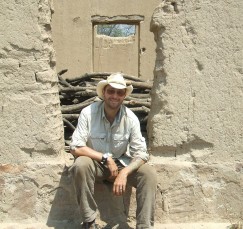- Home
- >
- Press Releases/Announcements
- >
- Lewis Borck is Newest Preservation Fellow
Archaeology Southwest Announces Latest Preservation Fellow
University of Arizona School of Anthropology doctoral candidate Lewis Borck to pursue Preservation Archaeology in southern Arizona

Tucson, Ariz. (October 22, 2012) — Archaeology Southwest is pleased to welcome its newest Preservation Fellow, Lewis Borck. Mr. Borck is the seventh fellow in the signature program, which provides doctoral candidates the opportunity and funding to complete a three-year program of original archaeological research while broadening the range of experience generally offered by academic programs. Mr. Borck’s forthcoming research will contribute to Archaeology Southwest’s long-term quest to understand more about the lives of Southwest peoples in the centuries just before the Spaniards arrived.
“We are delighted that Lewis is joining us,” said Dr. William Doelle, Archaeology Southwest’s President and CEO, and the visionary behind the Preservation Fellow program. “The profession of archaeology has changed significantly since I was a graduate student in the early 1970s. These days, students must be trained in a manner that provides them with maximum flexibility in a constantly changing job market,” Doelle continued. “Through this program, our fellows engage in diverse administrative, public outreach, and research responsibilities, gaining the expanded skills necessary in a highly competitive employment environment. They take seriously the responsibility of sharing results with the public.”
The fellowship program reflects Archaeology Southwest’s commitment to Preservation Archaeology, the holistic, conservation-based approach the organization has developed over the past thirty years. Preservation Archaeology seeks to optimize what remains for future exploration and discovery. Because archaeological remains are a nonrenewable resource, Preservation Archaeology balances impacts to these resources with long-term preservation and protection goals. Findings are shared with local communities, the interested public, and the professional archaeological community, in order to raise—and support—awareness of the fragility, meaning, and value of the places of the past.
A doctoral candidate at the University of Arizona’s School of Anthropology, Mr. Borck has worked in the Southwest since 2005. Although he has excavated in diverse places, from Chaco Canyon to Peru’s northern deserts, Mr. Borck commented that he “always ends up back in the dust of the Sonoran and Chihuahuan deserts.” Mr. Borck studies frontiers and forms of cultural resistance in the archaeological record, focusing on the interactions of peripheral groups with their more powerful neighbors. He is also interested in combining GIS and social network analysis. His master’s research applied these interests to the archaeology of the Gallina region of north-central New Mexico.
“As we ask all prospective fellows to do, Lewis designed research that will integrate with one of our current initiatives, which we call ‘Edge of Salado,’” explained Dr. Jeffery Clark, a Preservation Archaeologist at Archaeology Southwest, and one of the lead investigators on the project that Mr. Borck is joining. “We’re examining evidence from certain southern Arizona sites that date to the 1300 and 1400s in order to understand why some communities resisted, or did not participate in, a phenomenon known as ‘Salado.’ This was a powerful ideology—a cultural mixing—that developed over generations as immigrants from the Four Corners became integrated into existing communities in southern Arizona and southwestern New Mexico.”
Archaeology Southwest’s Preservation Fellowship program is supported through an endowment fund and supplemented by private donations.
ABOUT ARCHAEOLOGY SOUTHWEST
Archaeology Southwest is a private 501(c)(3) nonprofit organization based in Tucson, Arizona, that explores and protects the places of our past across the American Southwest and Mexican Northwest. For three decades, Archaeology Southwest has practiced a holistic, conservation-based approach known as Preservation Archaeology. By conducting low-impact investigations of big-picture questions, sharing findings with the public, and developing powerful site protection strategies, Archaeology Southwest creates meaningful connections to the past and respectfully protects its increasingly endangered resources.
Learn more at www.archaeologysouthwest.org.
ABOUT THE PRESERVATION FELLOWSHIP PROGRAM
Archaeology Southwest’s Preservation Fellow Program supports an advanced graduate student in archaeology for three years. At the end of this period, the fellow will have completed a doctoral dissertation. The fellow receives a monthly stipend and health insurance for the duration of the fellowship. Limited funds are available for annual research expenses, and the fellow must at least match those funds through successful proposals to outside grant funding sources, particularly the National Science Foundation.
The fellow defines a research problem that complies with the requirements of his or her degree-granting institution and works within Archaeology Southwest’s Preservation Archaeology priorities.
Learn more at www.archaeologysouthwest.org/who-we-are/preservation-fellowship/.
Explore the News
Related to This
-
Project The Edge of Salado